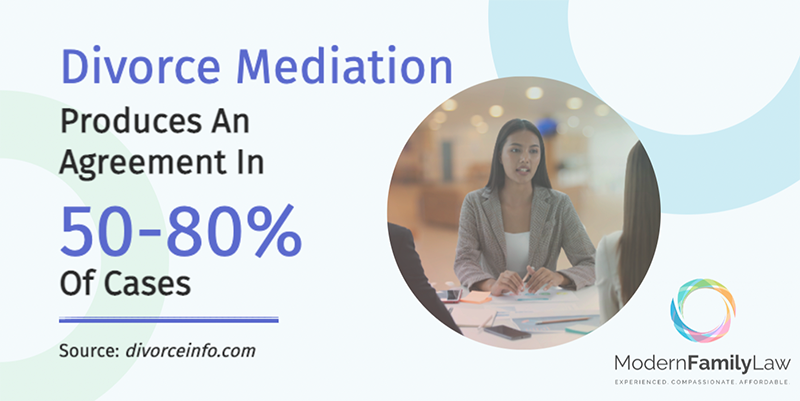MEDIATION ATTORNEYS
IN COLORADO
Modern Family Law's Colorado divorce mediation lawyers are trained professionals who help couples resolve their divorce through mediation. Mediation is a voluntary process in which the couple works together with a neutral third party, the mediator, to reach an agreement on the terms of their divorce. The mediator's role is to help the couple communicate effectively, explore their options, and develop a settlement agreement that meets their needs.
Our divorce mediation lawyers can provide several benefits to couples going through a divorce. Mediation can be less expensive and more time-efficient than going to court and can help couples maintain a positive relationship which is important for their children and their future. Learn about mediation in Colorado below including:

Mediation can be a great way to resolve your divorce in a fair and amicable way. With the help of Modern Family Law's qualified Colorado divorce mediation lawyers, you can reach an agreement that meets your needs and the needs of your family. Let us help you find an resolution to your case!
WHAT IS MEDIATION
IN COLORADO?
Divorce mediation is a process that involves the use of a neutral third-party mediator to help a couple reach an agreement on the terms of their divorce. This process is becoming increasingly popular as an alternative to traditional divorce litigation, which can be expensive, time-consuming, and emotionally taxing. In mediation, couples work together to come up with a mutually acceptable solution to the issues that arise during a divorce, such as property division, child custody, and spousal support.
In the state of Colorado, the divorce process is governed by state law and involves a series of steps that must be followed in order to legally end a marriage. These steps include filing a petition for dissolution of marriage, serving the petition on the other party, and attending court hearings to finalize the divorce. However, divorce mediation can offer an alternative to this process, allowing couples to work through their issues outside of court in a more collaborative and less adversarial manner.

WHAT ARE THE BENEFITS OF MEDIATION
IN COLORADO DIVORCE?
Divorce mediation offers several advantages over traditional divorce litigation. Here are some of the benefits of choosing mediation as a way to resolve your divorce in Colorado:
1. Cost Savings Compared To Traditional Divorce Litigation: Mediation can be significantly less expensive than a traditional divorce. Because the parties work together with a mediator, they can often resolve their issues more efficiently and with fewer legal fees.
2. Faster Resolution Times: Mediation can be a much faster process than traditional divorce litigation. Instead of waiting months or even years for a court date, the parties can typically schedule mediation sessions much more quickly.
3. Greater Control Over The Outcome: In mediation, the parties have more control over the outcome of their divorce. Instead of having a judge make decisions for them, the parties work together to reach a mutually acceptable agreement.
4. Less Animosity Between Parties: Mediation can be a less adversarial process than traditional divorce litigation. By working together to find common ground, the parties can often reduce the level of conflict and hostility that can arise during a divorce.

5. Potential For A More Amible Co-Parenting Relationship: Because mediation encourages cooperation and communication between the parties, it can often lead to a more amicable co-parenting relationship after the divorce is finalized. This can be especially beneficial for families with children who will need to maintain a relationship with both parents.
HOW DOES MEDIATION WORK
IN COLORADO?
Divorce mediation in Colorado involves the use of a trained and neutral third-party mediator who helps the couple come to an agreement on the terms of their divorce. Here are the key aspects of how divorce mediation works in Colorado:
1. Role of the Mediator: The mediator is responsible for facilitating communication between the parties and helping them identify the issues that need to be resolved. The mediator does not make decisions or provide legal advice but rather helps the parties come to a mutually acceptable solution.
2. Issues Addressed in Mediation: Mediation can be used to resolve a wide range of issues that arise during a divorce, including property division, child custody, and spousal support. The parties can also use mediation to address other issues, such as parenting plans, visitation schedules, and communication protocols.
3. Mediation Process: The mediation process typically begins with an initial consultation between the mediator and the parties. During this consultation, the mediator explains the process, sets expectations, and answers any questions. Subsequent mediation sessions are scheduled and conducted in a neutral location and may involve both joint and separate sessions.
4. Agreement: If the parties can reach a mutually acceptable agreement, the mediator will draft a written agreement that outlines the terms of the divorce. The parties can then submit this agreement to the court for approval and incorporation into the final divorce decree.
Overall, divorce mediation in Colorado is a collaborative process that empowers the parties to find their own solutions to the issues that arise during a divorce. By working together with a neutral mediator, the parties can often reach a faster, less expensive, and more amicable resolution to their divorce.
WHAT OUR CLIENTS SAY ABOUT OUR
EXPERIENCED FAMILY LAWYERS IN COLORADO
I only ended up choosing another attorney to go with because of some very specific nuances of my case. However, before I went with that attorney, Grace was at the Top of my List! I highly recommend her and Modern Family Law Firm. They consulted the extreme vulnerability of my situation so delicately and with the utmost professionalism, and I thank them for their consideration and time 🙂
I only ended up choosing another attorney to go with because of some very specific nuances of my case. However, before I went with that attorney, Grace was at the Top of my List! I highly recommend her and Modern Family Law Firm. They consulted the extreme vulnerability of my situation so delicately and with the utmost professionalism, and I thank them for their consideration and time 🙂
I would recommend her to anyone. 5 stars all around. Thank you!!!!
I would recommend her to anyone. 5 stars all around. Thank you!!!!
FREQUENTLY ASKED QUESTIONS ABOUT
MEDIATION IN COLORADO
Is Mediation Mandatory In Colorado Before Filing For Divorce?
In Colorado, mediation is not mandatory before filing for divorce. However, the court may require parties to attempt mediation or another form of alternative dispute resolution (ADR) before proceeding to trial. This is because ADR methods, including mediation, can often help parties reach a more efficient, cost-effective, and mutually acceptable resolution to their disputes.
If the parties are unable to reach a mediation agreement, they can still proceed to a trial where a judge will make a final decision on their case. However, the court may take into consideration whether the parties attempted to mediate their disputes in good faith when making decisions about the case, such as awarding attorney fees or determining the division of property.
Ultimately, the decision to use mediation in a divorce case is up to the parties involved, and it’s important to speak with an experienced family law attorney to discuss the benefits and potential drawbacks of mediation as compared to other forms of dispute resolution.
Is The Agreement Reached In Mediation Binding?
Yes, if the parties reach a written agreement in mediation, it is generally binding and enforceable in court. The agreement reached in mediation is typically referred to as a Mediated Settlement Agreement (MSA), and it is a legally binding contract between the parties. The MSA may address issues such as property division, child custody and visitation, child support, and spousal support.
Once the MSA is signed by both parties and their attorneys (if they have them), it becomes a binding contract that can be submitted to the court for approval. If the court finds that the MSA is fair and equitable and in compliance with Colorado law, it will likely be incorporated into the final divorce decree.
It’s important to note that the parties have the opportunity to review and revise the MSA before signing it, and the mediator will typically encourage them to seek advice from their attorneys before finalizing the agreement. However, once the MSA is signed and submitted to the court, it can be difficult to modify or challenge its terms.
Can The Parties Still Go To Court If Mediation Fails?
Yes, if the parties are unable to reach a mediation agreement, they can still go to court to resolve their disputes. Mediation is a voluntary process, and the parties are not required to reach an agreement. It’s estimated that around 80% of family law cases that go to mediation are eventually resolved, but in some cases, the parties simply cannot reach a resolution that they both find acceptable.
If the parties are unable to reach a mediation agreement, they may proceed to trial. At trial, a judge will make a final decision on the issues that the parties were unable to resolve through mediation, such as property division, child custody, and spousal support. Going to trial can be a much more expensive and time-consuming process than mediation, and it can also be more emotionally draining and acrimonious.
It’s worth noting that even if the parties are unable to reach a full agreement in mediation, they may still be able to resolve some of their issues and narrow the scope of their disputes. For example, they may be able to agree on some aspects of their property division or child custody, which could make the trial process more efficient and less costly.
OUR COLORADO FAMILY LAW OFFICE LOCATIONS
OUR COLORADO FAMILY LAWYERS
ARE READY TO LISTEN!
Our experienced family attorneys in Colorado
work with clients looking for a fair and amicable way to end their marriages.
Reach out today to and let our experienced attorneys help you.
Schedule A FREE
Consultation
